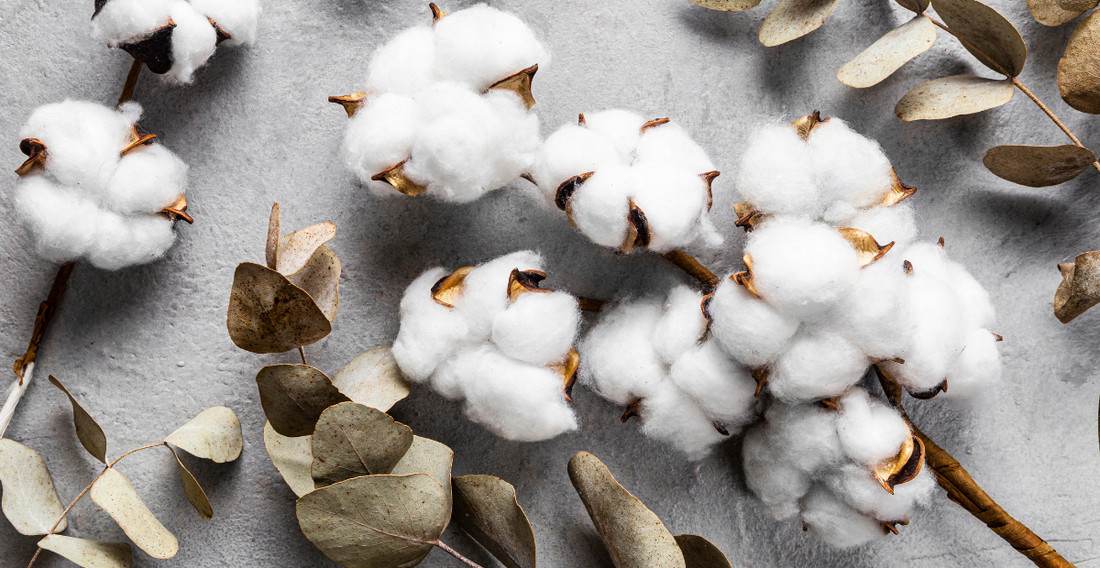
13 Reasons to Shop (GOTS Certified) Organic Cotton
Share
Understand the impact of your apparel on the environment and your body.
Do you know what the clothes you’re wearing right now are made out of? Chances are that you probably don’t. Most of us don’t think twice about it, stocking up on apparel that suits our personal fit and style but never looking at the fine print on the inside tags.
But times are changing, and you, the modern consumer, are starting to shop smarter.
For instance, when you shop for groceries it’s become increasingly normal to check the ingredients in your food before you buy it. You understand that not every item is good for you to consume – because it isn’t good for your health or doesn’t align with your lifestyle standards.
With fashion, similarly, the time has come for you to have a basic understanding of the ingredients touching your skin and their impact on our environment.
For example, clothes made of fast fashion fabrics like nylon or polyester shed up to half a million tons of microplastics from all of the combined wash and dry cycles we use on them at home, flushing them into our sewers, waterways and oceans where they are ultimately eaten by sealife and fish, and then later consumed further up the food chain by humans. Sadly, microplastics have been studied and found to leach chemicals in our human body tissues that act as endocrine-disrupting compounds, or toxicants that imitate hormones when they enter the body.
This, understandably, may make you think twice about investing in more nylon or polyester apparel.
Having said that, there is, of course, a long list of other fabric options to choose from…so where do you start in understanding which are good, healthy choices vs. those that are worth avoiding? It could take a while to get through all of your options, so for the purposes of this article we’re going to focus only on the very best on the list you should look for when shopping for something new in your wardrobe — GOTS certified organic cotton.

What is GOTS Certified Organic Cotton?
The Global Organic Textile Standard (GOTS) is recognized as the world's leading processing standard for textiles made from organic fibers. Not only does it require that the plants are grown without pesticides, it also requires environmentally and socially responsible manufacturing. It is because of these stringent standards that make GOTS certified organic cotton a gold standard of fabric for both you personally and the environment.
Organic cotton products are also softer and gentler for your skin – the fibers are comparably longer than conventional cotton. Its natural origin also makes it a better choice for infant clothing and toddler apparel due to its softness and the lack of harmful chemicals used in the manufacturing process.
To go a level deeper in exploring how organic cotton earns its GOTS certification, here are 13 reasons to consider shopping for GOTS certified organic cotton clothing instead of other synthetic and artificial fabrics – in fact, these are the rigorous standards that organic cotton fabric must meet to achieve the GOTS certification.
- Textiles must be 95% organic in origin to be GOTS certified organic.
- Toxic chemicals used in some conventional textile processing, like formaldehyde, heavy metals, and brominated flame retardants, cannot be used.
- From farm to factory, organic fibers cannot commingle with conventional.
- Dyes must be naturally derived or safe synthetics (as outlined in the GOTS).
- Manufacturers can’t use finishing methods that pose risks to workers (like sand-blasting denim).
- Manufacturers must have environmental policies and procedures to monitor and improve the environmental performance of their facilities.
- Organic textiles must be stored and transported in a way that prevents contamination by prohibited substances and commingling with conventional products.
- Packaging material must not contain chlorinated plastics (e.g. PVC).
- Any paper or cardboard used in packaging material for the retail trade of GOTS goods (including labeling items such as hang tags or swing tags) must be recycled from pre- or post-consumer waste or certified according to a program that verifies compliance with sustainable forestry management principles.
- Transportation means and routes must be documented.
- Textiles must meet specific quality standards in regards to how they hold up to washing and color fading.
- Workers have to be treated well with safe working conditions, no child labor, fair wages, a cap on how many hours they can work a week, and more.
- Final products for personal care items like diapers, bandages, and feminine care products must be 100% organic fiber. Plastic barriers must be biodegradable and made from non-GMO (genetically engineered) raw materials. They also can’t include unnecessary dyes or optical brighteners – among other things.
Ready to give GOTS certified organic cotton clothes a try?
Organic living may not be for everyone, but whether shopping for yourself, your significant other, your children or friends, keep in mind that the ingredients in the clothes you buy have an impact on the world around you. As a best practice for you as a modern shopper, do some basic research on what fabric your clothes are made of, and even where the clothes are made and who manufactures them.
